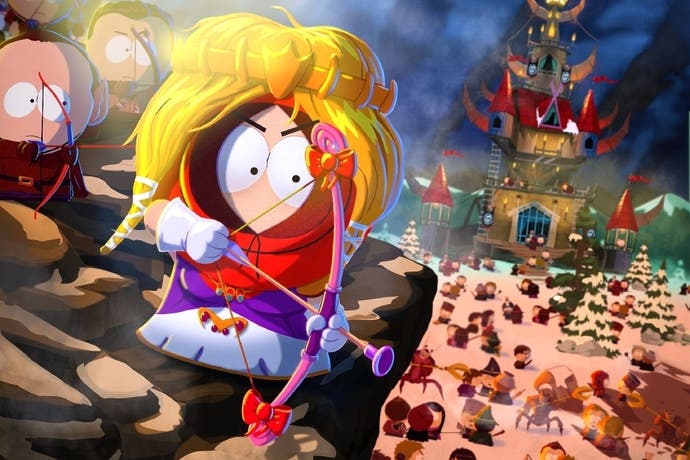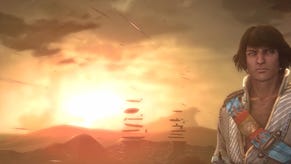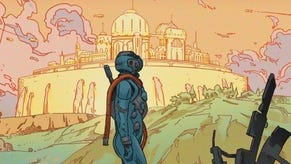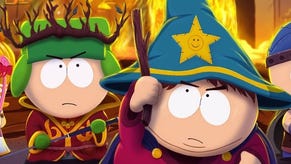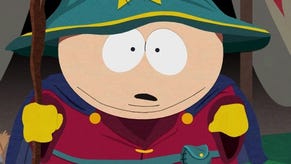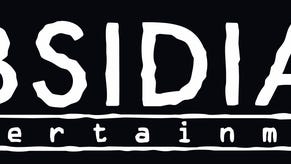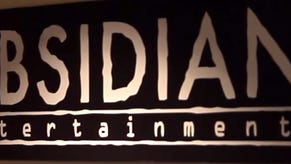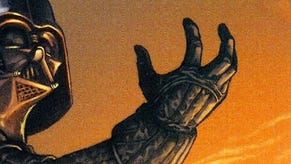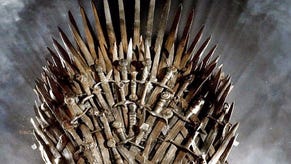South Park: It all started with a suspected prank call
A remarkable collaboration, as told by Obsidian.
Feargus Urquhart, the leader of Obsidian Entertainment, was playing through that alien probing scene in his studio's game, South Park: The Stick of Truth, the evening before a meeting with South Park creators Trey Parker and Matt Stone. The next morning he'd have to go and talk to them about censoring it.
Urquhart was at the top of his house. His children weren't allowed up but his wife was, and up she came, watching in silence as the scene unfolded.
"That's atrocious!" she declared when Urquhart timidly turned for her verdict. "I'd never ever heard her use that word before," he tells me.
"I know," he replied
"What is that?" she asked.
"It's..." and he pauses, remembering his embarassment, "the game."
"Uh."
He had to tell Parker and Stone.
"I've got to tell you guys," he said when they sat down the next morning, "my wife was watching me last night play this and the word she used was 'atrocious'."
Their response was unanimous.
"Yeah!"
That's what South Park does, that's what Parker and Stone do - cross the line. Urquhart's wife's exclamation was exactly the validation they crave.
Imagine being Obsidian reading po-faced reports from game certification departments at Sony, Microsoft, ESRB and PEGI. "In hour X, minute X, a minor is subjected to non-consensual... You know what I mean?" Urquhart giggles, talking to me on Skype.
"This is our video game! Look at what daddy made!"
Censorship came nonetheless, the European PS3 and 360 versions masking seven controversial scenes, each around 20 seconds in length. No strangers to censorship, Parker and Stone - to their credit - wrote humorous screens to mask the content, but it was still odd, still jarring and still Ubisoft's decision to do it.
"I'll be honest," Urquhart says, "for me that scene is funny as hell. But then it's hard for me to judge other people and whether they feel it should be in a game or not. That's really hard for me."
How did Parker and Stone take it?
"That's where we don't... have that conversation!" he snorts in amusement. "That's one of the few times we get to say 'we're just the developer'.
"That's a Ubisoft-South Park conversation."
Obsidian was simply told to do it. "This is what we need to do, here are the things you need to do, South Park will get you the things that you need and there we go."
I imagine him shrugging. "Internally it was not a big conversation. You have to put it into perspective; we're trying to get this game done. The worst thing for us is if that conversation had taken two months, because we would be sitting with a part of the game waiting to be figured out, which is just scary as hell for us."
But Urquhart would have stuck his neck out had things gone too far.
"At some point if the censorship had gone to even more of an extreme, and particularly if there wasn't a PC version, then I would have gotten more involved, as to say 'this is getting ridiculous'."
"If the censorship had gone to even more of an extreme ... then I would have gotten more involved, as to say 'this is getting ridiculous'"
Feargus Urquhart
It all started a long time ago in the winter of 2009, with what, as the story goes, Obsidian thought was a prank call.
"We got this phone call about 'hey do we want to talk to the South Park guys?' and we were like, 'Yeah, right.'" This, out of the blue? It had to be those Red 5 Studios guys upstairs messing around.
"I call back and it was, 'No, no, we're actually South Park.'
Parker and Stone wanted to make a game, and Obsidian was on their list.
"There was one call to make sure we weren't... mutants," he chuckles, and then they arranged a face-to-face.
Thing is, you never know how celebrities will be behind closed doors. Urquhart is no stranger to actors, to directors, what with being located in Southern California and Obsidian recording hours of voice-overs over the years.
"We meet people, you know. It's not like we go clubbing in LA and do coke with Snoop Dogg and drink champagne," he jokes, but, all the same, he wondered what Parker and Stone would really be like. "Are they going to be two guys in suits with an entourage?"
He was briefed by South Park Digital Studios' Greg Kampanis ahead of the meeting. Urquhart was used to presentations but Kampanis had some advice. "You're not going to be telling Trey anything he doesn't already know," he said.
Urquhart gave the speech. "And it became very obvious very quickly that Trey knows all the games that we've made and probably has played most of them. He put hours and hours and hours into Fallout: New Vegas," he later learned.
They talked RPG vision, they talked Parker and Stone's "successes and failures in the video game space", and they talked making the South Park game. As the meeting closed, one thing was abundantly clear: if the game didn't look and feel like the TV show, there was no point. "I can remember particularly Matt saying 'absolutely, that's a thing. It has to be the show.'"
And no, Parker and Stone weren't in suits, with an entourage. "They're totally the guys you see on TV."
"Matt and Trey understood that South Park ... is going to scare a publisher"
"The best thing about being in a meeting with Matt and Trey," Obsidian creative director Chris Avellone once told me, "is when they start getting really excited about a quest-line, they'll start acting out sequences in the actual character voices.
"Suddenly they'll be Cartman talking about the quest, and they'll be funny about it, and just seeing that spontaneous burst of humour is just really great. You sit back and let them go and you're like, 'Now I understand how funny this area is going to be.'"
Parker and Stone's involvement wasn't just for show: Obsidian's relationship with the creators of South Park bordered on unprecedented.
"They would often give us a lot of time," Urquhart says. "We usually would spend, depending upon the meeting, an hour-and-a-half [to] two-and-a-half hours with Matt and Trey.
"We flew out to New York when they were finishing up The Book of Mormon," the satirical musical they wrote. "They set aside time so we could fly out there and have meetings with them - a few two-to-three-hour meetings over the course of three-to-four days. They were very involved. This is a very different licensed game to a lot of stuff. They really put the time into it."
They did more than that: they - their company - financed the game, at least to begin with.
"Matt and Trey understood that South Park - well everybody understands what South Park is - is going to scare a publisher," Urquhart believes. "If a publisher is putting in their money from dollar-one, they're going to want to control that from dollar-one, and they're going to be conservative. For the big games, it's hard to say that not being conservative pays off.
"The idea was, once we get it to a certain point then we have something to sell and show, so people get it."
People got it all right, but getting people to bite was another matter. Friends outside of the deal said things like, "A South Park RPG... really?" Another friend, who runs development at a major developer, said: "I personally want to play that game but I don't know how to sell it internally."
Then along came THQ with a deal - a deal that turned into a fuller publishing deal when South Park owner Viacom squeezed funding because it was having second thoughts about games.
"We knew we were signing up with a publisher that potentially had some issues"
"You've been doing this for a while, I've been doing this for a while," Urquhart levels with me, "so talk of THQ having financial difficulty was sort of a normal conversation for years! We knew we were signing up with a publisher that potentially had some issues."
Those became serious issues when tablet toy uDraw tanked, and THQ execs started talking about taking "a big hit". A slightly more obvious sign things were going belly up was, "Oh, they filed for bankruptcy!"
But still Obsidian didn't fluster. Chapter 11 bankruptcy is something companies file for all the time, Urquhart informs me - it's the "re-orging" (re-organising) manoeuvre that gets debtors off your back. He gets it. So when THQ boss Jason Rubin got around to calling Urquhart that evening, he was pleasantly surprised. "Holy s***!" Rubin exclaimed. "You're like the first person today who actually has understood that!"
"And then it got weird," Urquhart says, "I'll have to admit - right after that."
It was Christmas 2012 when he found out about the impending THQ auction, at which the publishing rights to South Park: The Stick of Truth would be sold. "Holy... what is going on?!" was his reaction, and Christmas came and went in a cacophony of phone calls.
Urquhart wasn't allowed to the auction himself, but a friend of a friend had gone to the charmingly "underground" occasion, and described it as "the dirtiest... I had to take a shower afterwards, it was horrible". Slimy slippery money eels all wriggling over each other to get their deal.
Urquhart found out Ubisoft was his game's new owner roughly the same time we did.
"I would say 'that's such a weird thing to happen', but it's not. Being an independent developer, there are these constant points in time where you are waiting around to know 'am I going to get shot in the head today or not?'"
He was "very happy" it was Ubisoft, though, because of the company's heft and strong presence abroad, outside of the US. "Of course we were not looking forward to the uPlay conversation," he giggles.
Ubisoft took over, took stock and in September 2013 delayed the game to December. Then, a month before it was due out, another delay, this time to South Park's eventual release date in March 2014. Ubisoft North America's president Laurent Detoc said the game had required a "major overhaul" after it picked it up. "Within three weeks after acquiring the game, we sadly realised we had to turn this thing upside down if we hoped to deliver the experience everybody wanted,” Detoc said at the time. "It's been such a major overhaul to get to the point where we are that we couldn't let it go, even if that meant missing December."
I remember being concerned that something was very wrong. But what was really going on behind the scenes?
"I..." there's a pause, and Urquhart reluctantly clams shut, telling me he can't talk about it. He tells me nothing he'd say would conflict with "stuff that was coming out about those things, it's just hard to go into any detail".
I press: Did the game change considerably when Ubisoft took over?
"I can't answer that one either. Sorry."
"We have a general policy whenever we're talking to different publishers now: we don't do anything that has to do with Metacritic"
Whatever Ubisoft ordered done, worked - South Park lived up to the licence.
"People can make guesses about how much of it was made and then re-made, and then made and then re-made," he says, but the things the team outlined at the beginning as important "were validated in the end". Most importantly, the South Park game looked and felt like the TV show.
That's thanks to Parker and Stone's tireless commitment to the game, Urquhart praises. "They spent hours and hours and hours and hours and hours helping to get the game finished, up until probably two weeks before we submitted. They were on it almost until the bitter end.
"That's why in the end," he says, "the one thing you see in all the reviews, and all the people playing the game, is that it is South Park."
That's not to say things couldn't have been better - things can always be better. "We're friggin' perfectionists," Urquhart tells me, but then everyone is - it's the conditions that matter.
South Park: The Stick of Truth was a strange project for the studio in many ways. It was 2D, and it had to offer something other than "you're talking or you're killing", which is what, he titters, Obsidian's work tends to boil down to.
Having outsiders scrutinise Obsidian's methods was new and at times challenging as well. But as as Urquhart the wise man reflects, "We only get better as game developers when we open ourselves up more to criticism.
"We had to step back and really think about how we made games, because this game couldn't be made the same way as a lot of our other games, and it taught us a lot and the game turned out great."
According to Metacritic, cringe, South Park: The Stick of Truth (on PS3) is one of Obsidian's best games, scoring a review average of 86 per cent (the same as KOTOR2 on Xbox).
Metacritic is relevant here because an 85-plus score was exactly what Obsidian needed Fallout: New Vegas to achieve in order to receive a bonus payment from publisher Bethesda. But it didn't; Fallout: New Vegas averaged an agonisingly close 84 per cent, and Obsidian lost out, despite the game being a big success for Bethesda. There was quite a fall out.
There's nothing like that in place for South Park: The Stick of Truth, thankfully, and Obsidian never intends taking that road again.
"We have a general policy whenever we're talking to different publishers now: we don't do anything that has to do with Metacritic. It's an unfair way of... in a lot of ways it can only be used as a way to take advantage of a developer.
"Ultimately if a game is financially successful, if a developer has back-end royalties on that, then they should make those back-end royalties if they made money for the publisher."
Amen.
"I know there are people online asking for DLC and 'put it on PS4' ... I wouldn't be surprised if there's a conversation"
"Four years is a long time," Urquhart thinks aloud, considering the game's future. He says there weren't many plans beyond "let's get it out".
"I know there are people online asking for DLC and 'put it on PS4', and that kind of stuff, and we'll see. Once the smoke clears, I wouldn't be surprised if there's a conversation. But we'll see."
Even hazier are plans for a sequel. "Well we don't have the money and we don't have the licence, so..." you probably have as much idea as he does, he jokes. "I don't want to say we're the last guys to know, but we would happily do it if it was on the cards."
There is one certainty about the future, as far as South Park is concerned, and that's his unwavering enthusiasm to work with Trey Parker and Matt Stone again. "Absolutely," he says, without a moment's hesitation. "Oh absolutely. They're awesome guys! Trey in particular, he plays the games we play, I play, and it's awesome to have a guy who is the licence but also you can talk games with.
"We would absolutely work with them again."
